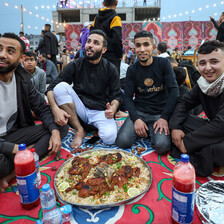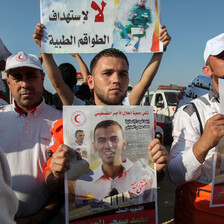The Electronic Intifada 27 December 2024

The funeral of Samira al-Bardini in central Gaza.
APA imagesAbdulaziz al-Bardini, a 29-year-old Palestinian medic, never imagined that his humanitarian mission would lead to the most devastating moment of his life. A volunteer with the Palestine Red Crescent Society since 2017, Abdulaziz’s world was forever changed on 30 October this year.
That morning began like many others during the ongoing Israeli genocide.
Stationed at a medical check-in point in al-Bureij refugee camp, Abdulaziz received an emergency call about an Israeli airstrike targeting a civilian vehicle in al-Maghazi, another camp in central Gaza. Without hesitation, he and his medical team rushed to the scene, navigating through rubble and chaos to respond to the cries for help.
“We arrived within three minutes,” he recounted to The Electronic Intifada on 13 November. “The airstrike had hit a civilian car with two missiles. The wreckage and injuries were horrifying.”
Abdulaziz immediately began assessing the victims. He treated three injured children, one of whom was in critical condition, and a woman who appeared lifeless.
“The children were my priority,” he explained. “Two of them had moderate injuries, but one – a 10-year-old boy – was in a dire state. He was bleeding internally and vomiting blood. My sole focus was to keep him alive.”
While Abdulaziz was working to stabilize the boy, bystanders carried the woman’s body to him saying she was already dead. He checked her for vital signs and confirmed her death.
“I covered her respectfully and placed her on the medic’s seat in the ambulance,” he said. “There was no time to inspect her further; I had to focus on saving the living.”
The ambulance raced to the hospital, where Abdulaziz carried the critically injured boy to the intensive care unit. After ensuring the child received immediate attention, he returned to the ambulance to retrieve the woman’s body.
Still unaware of her identity, he asked the attending doctor to confirm her death.
“I told the doctor, ‘She’s alone. Please register her as an unidentified victim,’” Abdulaziz recalled.
The doctor confirmed she had died, and Abdulaziz prepared to leave.
However, a strange feeling compelled him to look at her again.
The heartbreaking moment of recognition
“I can’t explain it,” Abdulaziz said. “Something inside me told me to take one more look.” He uncovered her face, and his world came crashing down.
“It was my mother,” he whispered, tears welling up. “Her face was different because of the shrapnel wounds. At first, I didn’t recognize her. But then I froze. It was her.”
Shock consumed him.
“I stood there, not believing what I was seeing. I kept telling myself, ‘This must be someone else’s mother. Someone will come and say it’s their loved one.’ But the truth was staring at me.”
Abdulaziz’s mother had been struck by shrapnel that pierced her eye and exited through her skull, causing fatal injuries. Only hours earlier, she had prepared him tea and a sandwich before his work shift.
Her last words to him echoed in his mind: “Take care, my love. May God protect you.”
Unable to contain his emotions, Abdulaziz broke down in uncontrollable sobs. His concerned colleagues, including a doctor, some nurses, and two paramedics, gathered at his side.
“They asked me who she was,” he said. “All I could say was, ‘I swear to God, this is my mother. I didn’t even recognize her.’”
Abdulaziz’s grief was compounded by the realization that he had unknowingly transported his mother’s body.
“I treated her as I would treat any martyr, with respect and dignity,” he said. “I never imagined I was carrying my own mother.”
This was not Abdulaziz’s first encounter with personal tragedy on the job. During the continuing Israeli attacks, he has transported the bodies of four fellow medics he considered close friends.
They were all killed by an attack on their ambulance.
Abdulaziz has also retrieved the remains of extended family members. Yet the pain of carrying his mother’s lifeless body was unparalleled.
“I’ve seen death many times,” he said. “But nothing prepares you for this.”
Despite the emotional toll, Abdulaziz remains committed to his work. The war has decimated Gaza’s healthcare system, leaving medics like him on the frontlines with dwindling resources.
“I can’t stop,” he said. “If I leave, who will help the next person in need?”
As Abdulaziz continues to navigate the devastation, he carries his mother’s memory with him.
“She taught me to be strong, to help others,” he said. “I will honor her by continuing to do that.”
He ended his account with a heartfelt plea: “Stop this war. Stop the suffering. Gaza is bleeding, and its people cannot endure any more loss.”
Mustafa Tayseer al-Burai is a journalist in Gaza.



